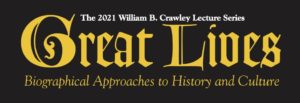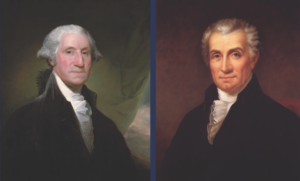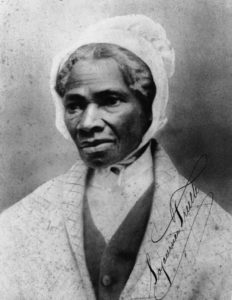
The “Great Lives” lecture series kicks off on Tuesday, Jan. 19 at 7:30 p.m. with a lecture on former Presidents James Monroe and George Washington, delivered by UMW Museums Executive Director Scott Harris. The Barlow & Thomas, P.C. Lecture.
Because of restrictions on public gatherings on campus, the entire series of 18 lectures will be pre-recorded and delivered electronically, through Zoom Webinars, with closed captioning available.
Although the presentations will be taped in advance, there will still be a live Q&A session following the online debut of each lecture, in which the speaker will be available to answer questions submitted by audience members.

Presidents George Washington and James Monroe are the subjects of the first “Great Lives” lecture on Jan. 19.
From Revolutionary War battlefields to the arenas of American politics, George Washington and James Monroe navigated a complex relationship. Mutual regard and affection, born in the shared experience of fighting for the cause of independence, eroded steadily amid the early Republic’s changing political and diplomatic landscape. The resulting estrangement revealed much of the character of both men.
The emergence of Federalist and Republican factions during Washington’s presidential administration enflamed both domestic and foreign affairs. Monroe’s first diplomatic mission to France was a casualty of this partisan divide. His advocacy of Republican principles and the traditional alliance with France ran counter to the Federalists’ goal of improving relations with Great Britain. Recalled from his post in disgrace, Monroe aired his grievances with Washington publicly and received harsh criticism in return. The rift between the two men, personally distressing to both, was never repaired.
Or was it? Monroe’s presidency echoed symbols and values evident in that of Washington: popular tours of the country, efforts to mitigate party divisions, and a foreign policy aimed at insulating the United States from entanglements in European conflicts. Perhaps the Revolutionary Rift between George Washington and James Monroe was, in the end, healed.
The series continues on Thursday, Jan. 21 with a lecture on abolitionist Sojourner Truth by Professor of History Claudine Ferrell. The sPower Lecture.

Abolitionist Sojourner Truth is the subject of the “Great Lives” lecture on Jan. 21.
Sojourner Truth began life in 1797 as a slave named Isabella in Ulster County, New York. After years of hard work and abuse, she ended her enslavement in late 1826. She then re-invented herself. The strikingly intelligent but illiterate young woman became an uncompromising abolitionist, a famed and witty speaker, a proponent of women’s rights, and an inspiring preacher. By the 1850s her Narrative of Sojourner Truth (1850) and Bible-inspired lectures made her name a familiar one throughout the northern states and in the nation’s newspapers. During her life, she used hard work, the speaker’s podium, the courts, and song as she fought against slavery and racial inequality and advocated for rights of women black and white. She won a legal action that freed her son, recruited black troops for the Union army, campaigned for temperance, and met with presidents. After the Civil War, she helped settle freed slaves, and even into her eighties, she worked to aid the migrant Exodusters in the 1870s. She died in 1883 in Battle Creek, Michigan, which honors her today with a massive statue that befits the six-foot-tall traveler for truth.
For more information and a full list of lectures, visit umw.edu/greatlives or contact the Office of University Events and Conferencing at 540-654-1065.